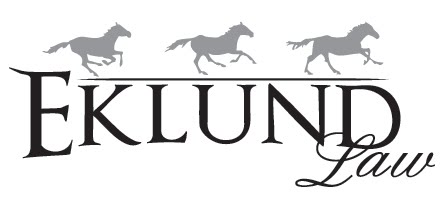Confusion over cross-statutory application of new law defining horses as livestock
In 2010, the Minnesota Legislature passed a bill, supported by the Minnesota Horse Council, creating a new statute defining horses as livestock and raising them as an agricultural activity. The statute was codifed in the agricultural code at Minn. Stat. § 17.459. The statute reads:
Subdivision 1. Classification as livestock. Horses and other equines raised for the purposes of riding, driving, farm or ranch work, competition, racing, recreation, sale, or as breeding stock are livestock. Horses and their products are livestock and farm products for purposes of financial transactions and collateral.
Subd. 2. Agricultural pursuit. Raising horses and other equines is agricultural production and an agricultural pursuit.
Subd. 3. Nonapplicability for property tax laws. This section does not apply to the treatment of land used for raising horses under chapter 273.
The purpose of the new law was to help horse and equine property owners gain access to various benefits afforded to agricultural land and businesses. But because Minnesota Statutes are organized by subject matter into chapters, a general policy statement such as “horses are livestock” enacted in one chapter can have unintended consequences in other chapters.
The most obvious potential conflict was explained by the Minnesota Department of Revenue (MDOR) before the law was enacted. MDOR suggested adding Subdivision 3’s nonapplicability for property tax laws because property tax assessors are governed by a different chapter setting standards for property tax classification. Minn. Stat. § 273.13 Subd. 23 sets forth the requirements for agricultural classification for property, which must be at least 10 acres in size and used for agricultural purposes. Agricultural purposes is defined as raising agricultural products for sale, and those products are listed in Minn. Stat. § 273.13 Subd. 23(i). Livestock raised for sale constitute an agricultural product, as does pasture used for grazing commercially boarded horses. But MDOR worried that the new law, Minn. Stat. § 17.459, would result in residential or hobby-farmers claiming that their equine use of land is agricultural for property tax purposes despite a lack of genuine agricultural production on the property, so Subdivision 3 was added to the statute as enacted.
Paradoxically, the disclaimer in Subdivision 3 may be having an opposite effect: some tax assessors have reportedly suggested that the disclaimer now means that, in the property tax code, horses are not livestock. That is not the case. Horses always were and will continue to be livestock for purposes of property tax classification. MDOR has issued statewide guidelines for tax assessors explaining the proper method for classifying equestrian property, and it is settled law that raising horses for sale is an agricultural activity.
Another potential misinterpretation of Minn. Stat. § 17.459 lies in apparently conflicting language in Chapter 346, which sets care standards for “pet and companion animals,” including equines in Minn. Stat. § 346.38, and Chapter 343, which criminalizes animal neglect and cruelty. The apparent conflict is between Section 17.459’s definition of horses as livestock and raising them as an “agricultural use,” and Section 346.43’s exclusion of farm animals raised for food or “other agricultural use” from care standards, including care of equines in Section 346.38. However, because equines are afforded specific protections and the statute has not been repealed, the definition of horses as livestock should not have any effect on future prosecution for violations of care standards for horses. Furthermore, the animal cruelty statutes in Chapter 343 apply to all animals regardless whether they are farm animals or not, so long as they are “owned, possessed by, cared for, or controlled by a person for the present or future enjoyment of that person or another as a pet or companion…” In other words, horses are encompassed within both definitions as livestock and also as companion animals. Some horses even qualify as “service animals,” which are animals trained to assist a person with a disability and afforded special protections under Chapter 343. Just because horses are livestock and encompassed within the business of agriculture does not mean we value them any less as companions or that they are now excluded from care standards and anti-cruelty laws.
On the bright side of the passage of Minn. Stat. § 17.459, some equine property owners report greater success persuading zoning authorities that raising or boarding horses is an agricultural use of land permitted under local zoning laws. And the statute also may help horse farms qualify for the “family farm exception” to workers’ compensation liability and insurance requirements.
In an effort to educate local government about the unique role and protections afforded to horses as both agricultural and companion animals, the Minnesota Horse Council issues policy positions and will communicate with property tax assessors, law enforcement personnel, and county attorneys to help assure that horses’ unique status as partners with people is not confused or misinterpreted to their detriment.
